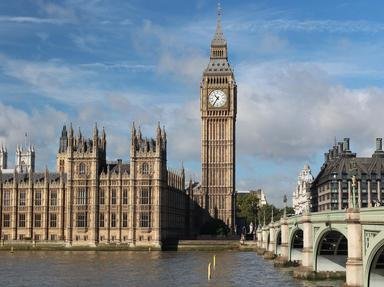Quiz Answer Key and Fun Facts
1. Constituency: Huntingdon. This British Conservative prime minister introduced the 'Back to Basics' initiative and had an extramarital affair with a fellow MP! He was instrumental in withdrawing from the ERM (Exchange Rate Mechanism) and thus commencing a long period of economic and financial growth.
2. Constituency: Cardiff South East (and others based in Cardiff). This British Labour prime minister was the first person to hold all four 'Great Offices of State' at one time or another.
3. Constituency: Finchley. This British prime minister was disparagingly known as "Milk Snatcher" after ceasing the free school milk policy whilst minister for education. Furthermore, this prime minister will forever be linked with the poll tax and the Falkland Islands.
4. Constituency: Oldham (as well as Epping). This British wartime prime minister is known worldwide for his famous "V" gesture and his fondness for cigars. He was prime minister on more than one occasion.
5. Constituency: Sedgefield. This politician was leader of the UK for ten years. During his decade in power he oversaw a period of sustained economic growth, but, his successes were marred and overshadowed by the public's reaction to the war in Iraq.
6. Constituency: Old Bexley and Sidcup. This Prime Minister had a well known dislike for the first ever female Prime Minister of the UK. He represented the Conservative Party and was the leader of Britain from 1970 to 1974.
7. Constituency: Kirkcaldy and Cowdenbeath. This minister was famous for dropping a common British income tax band from 22% to 20% as chancellor then infamous for raising another income tax band from 10% to 20% as prime minister.
8. Constituency: Limehouse. This British prime minister succeeded Winston Churchill after a landslide victory in the 1945 general election. During his time in office, Aneurin Bevan set up one of the most famous national medical institutions in the world.
9. Constituency: Birmingham Ladywood. This British prime minister is famous, or perhaps infamous, for his declaration of "...peace for our time". This Conservative leader was in charge of the country from 1937 to 1940.
10. Constituency: Ormskirk (later representing Huyton). This British prime minister was in power from 1964 to 1970 and in a later period from 1974 to 1976. He was in power during the Third Cod War.
Source: Author
jonnowales
This quiz was reviewed by FunTrivia editor
gtho4 before going online.
Any errors found in FunTrivia content are routinely corrected through our feedback system.

